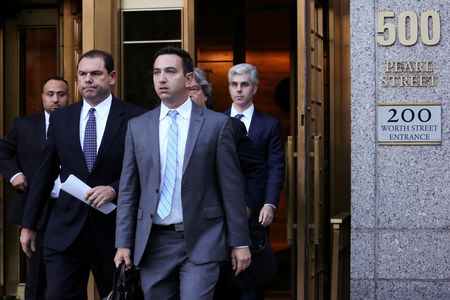 1
1 1
1
By Luc Cohen
NEW YORK (Reuters) -The U.S. Supreme Court on Monday gave a big boost to two real estate developers and a former state university official convicted of fraud for rigging bids for one of former New York Governor Andrew Cuomo’s signature projects, the latest reversal for the Justice Department in a major corruption inquiry.
The justices threw out lower court decisions upholding the 2018 convictions of Steven Aiello, Joseph Gerardi and Alain Kaloyeros, who were charged as part of a corruption crackdown by federal prosecutors in Manhattan centered on the state capital of Albany. The justices acted in light of their May 11 ruling overturning the related convictions of former Cuomo aide Joseph Percoco and construction executive Louis Ciminelli.
The court has hemmed in prosecutors in a series of political corruption cases in recent years.
Aiello, Gerardi and Kaloyeros were charged in 2016 in a sweeping federal probe into alleged corruption in Cuomo’s “Buffalo Billion” revitalization initiative for the city of Buffalo in upstate New York.
Percoco, a former Cuomo aide, had been found guilty of seeking $315,000 in bribes in connection with the initiative while managing the Democratic then-governor’s 2014 re-election campaign. His defense lawyers argued that because Percoco was no longer serving in government at the time of the actions at issue, he could not be convicted of bribery.
Lawyers for Aiello and Gerardi, real estate developers charged with orchestrating the payment of bribes to Percoco, made a similar argument.
The jury that convicted Percoco had been required “to determine whether he had a ‘special relationship’ with the government and had ‘dominated and controlled’ government business,” conservative Justice Samuel Alito wrote in the court’s ruling in that case. “We conclude that this is not the proper test for determining whether a private person may be convicted of honest-services fraud.”
Lawyers for Ciminelli, a construction executive convicted of conspiring to rig bids in connection with the plan, argued that prosecutors had relied upon an invalid legal theory of wire fraud that involved depriving a victim not of tangible property but of economically valuable information.
Lawyers for Aiello, Gerardi and Kaloyeros – a former official at a state university who helped administer the bidding process – raised that point as well.
Michael Miller, a lawyer for Kaloyeros, said he “could not be more pleased that the Supreme Court has recognized that the government relied on an invalid theory of wire fraud” to prosecute Kaloyeros, who he said “committed no crimes in connection with his efforts to bring lasting economic development.”
A spokesperson for the U.S. Attorney’s office in Manhattan declined to comment. Lawyers for Aiello and Gerardi did not immediately respond to requests for comment.
In overturning Ciminelli’s guilty verdict, the justices said that theory of fraud, known as “right to control,” is “inconsistent with the structure and history of the federal fraud statutes.”
Cuomo was not charged in the inquiry but resigned in 2021 in an unrelated sexual harassment scandal.
The Supreme Court, which has a conservative majority, increasingly has restricted prosecutors in political corruption cases. In 2020, it overturned the convictions of two aides to Republican former New Jersey Governor Chris Christie in the “Bridgegate” political scandal. In 2016, it threw out Republican former Virginia Governor Robert McDonnell’s bribery conviction.
(Reporting by Luc Cohen in New York; Editing by Will Dunham)